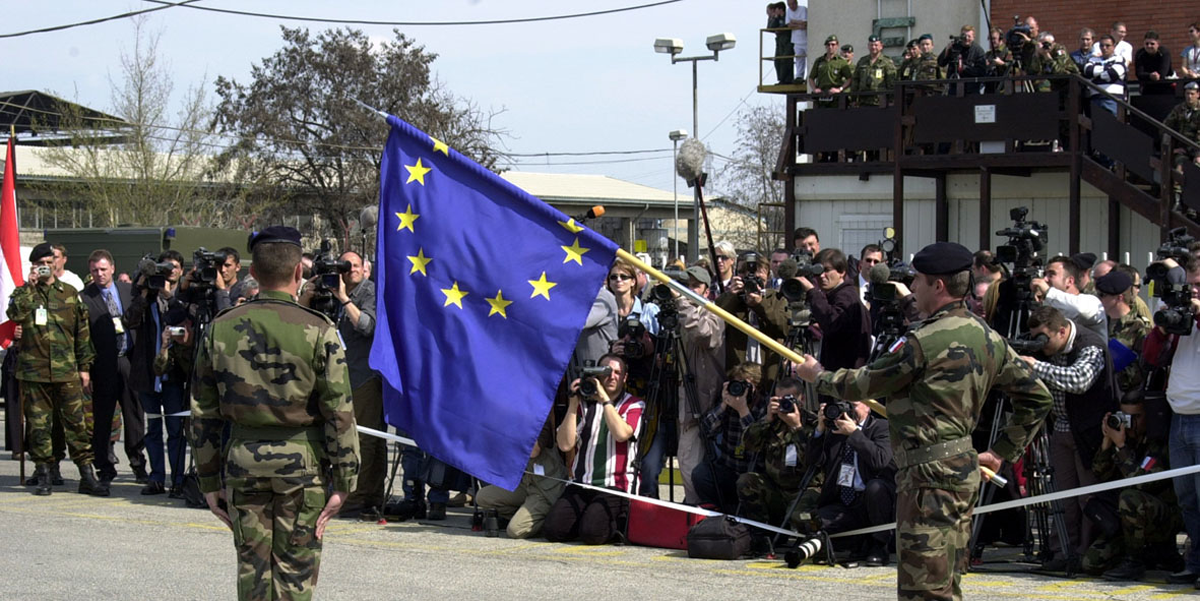
This article was originally published by the European Council on Foreign Relations (ECFR) on 20 November 2018.
‘European army’ is an empty phrase; what is actually needed is less talk and more action – more concrete projects to integrate defence efforts while avoiding careless talk.
Europe’s leaders appear to suffer from Tourette syndrome. Whenever the conversation turns to European defence, they feel an irresistible urge to utter the forbidden words: “European army”.
European Commission President Jean-Claude Juncker did this in 2015, handing invaluable ammunition to the Leave camp in the United Kingdom’s then-upcoming Brexit referendum – new evidence of the European Union’s imperial ambitions, they and their tabloid allies crowed. Perhaps learning from this experience, Europe’s leaders have largely avoided the deadly phrase since – contenting themselves with claims of progress towards a “defence union”, a term which has the advantage of conveying an idea without anyone being able to say exactly what it entails. But now the self-discipline has cracked again, with first French President Emmanuel Macron and then German Chancellor Angela Merkel hoisting the “European army” banner – immediately precipitating a fusillade of hostility from US President Donald Trump.
Perhaps the backlash would be worth it if those calling for a European army actually meant what they said. But they do not. For if the phrase is to have any real meaning, it must connote a commonly funded military force under a centralised, supranational command. Yet the idea that a French president or a German chancellor really wants to see the young men and women in their armed forces put in harm’s way on the say-so of some general in Brussels, and without the precise and explicit authorisation of their national authorities, is patently absurd. (Indeed, the German defence minister hastened to “clarify” that the Bundestag’s control of German armed forces is not up for debate.)
No one in Europe is ready to contemplate such a situation. Not the French, not the Germans, not the Brits – nor the Poles, the Portuguese, or anyone else. But, if that is not the deal, it is not a European army.
“Oh, don’t be so literal!”, some may now wish to say. “Accept the term for what it is: the expression of some vague future aspiration – or short-hand for the immediate need for Europeans to shoulder more of the burden of their own defence, by pooling more of their defence efforts and resources. Surely that’s unexceptionable?” To which the short answer is: “there is nothing wrong with the aim of greater European strategic autonomy”. As Macron reiterated before the Bundestag on 18 November – happily, with no repetition of “European army” – Europe is not content to become “the plaything of great powers” and must “assume greater responsibility for its security and defence”.
But there is everything wrong with the “European army” slogan. For it is not just misleading – it is counterproductive and damaging too.
To begin with: the (predictable) Trump reaction. Europe’s dependence on US protection is unhealthy and, given time and effort, unnecessary. Just reflect that, last year, EU member states between them spent almost four times as much on defence as did the Russians. But, today, Europe’s dependence is a fact; and, with the best will in the world, it will remain so for at least a couple of decades, so substantial are the gaps to be plugged before Europe’s militaries could manage without the Americans. In such circumstances, why on earth pick a fight on the issue with the self-styled “stable genius” in the White House, not least when there are so many other immediate issues – from climate change to Iran – on which transatlantic conflict is inescapable? Biting the hand that feeds you is seldom smart.
Nor is it only the Americans who can be estranged by “European army” talk. The Dutch prime minister has found it necessary to dissociate himself from the Macron/Merkel terminology.
And then – annoying though it, and they, may be – there are still those Brits to consider. In the coming months, they may even be rerunning their Brexit referendum. Should they do so, Europhobes will again seize on loose talk about a “European army” to misrepresent European strategic ambitions. Even assuming Brexit proceeds, the goal of European strategic autonomy will be significantly more plausible if the UK is prepared to lend its military weight to a defence partnership with the 27-member EU.
During the Second World War – a time in which too many Britons seemingly still wish they were living – one widely displayed official warning read “careless talk costs lives”. Europe’s leaders should bear that in mind when the talk turns to defence. As long as we Europeans remain dependent on US protection, we should be polite and grateful about it – while working to reduce that dependence. And “working” means not more European army talk nor even more carefully considered speeches, but concrete projects to plug Europe’s capability gaps and integrate various national defence efforts through more joint projects and other cooperation. Less talk, more action, please.
About the Author
Nick Witney is a Senior Policy Fellow at the European Council on Foreign Relations (ECFR).
For more information on issues and events that shape our world, please visit the CSS website.


One reply on “Fighting Words: The Risks of Loose Talk About a “European Army””
Maybe the Swiss Banking Systems can sponsor the EU ARMED Forces and pay for new wars to upkeep with market demands…
Stupid article